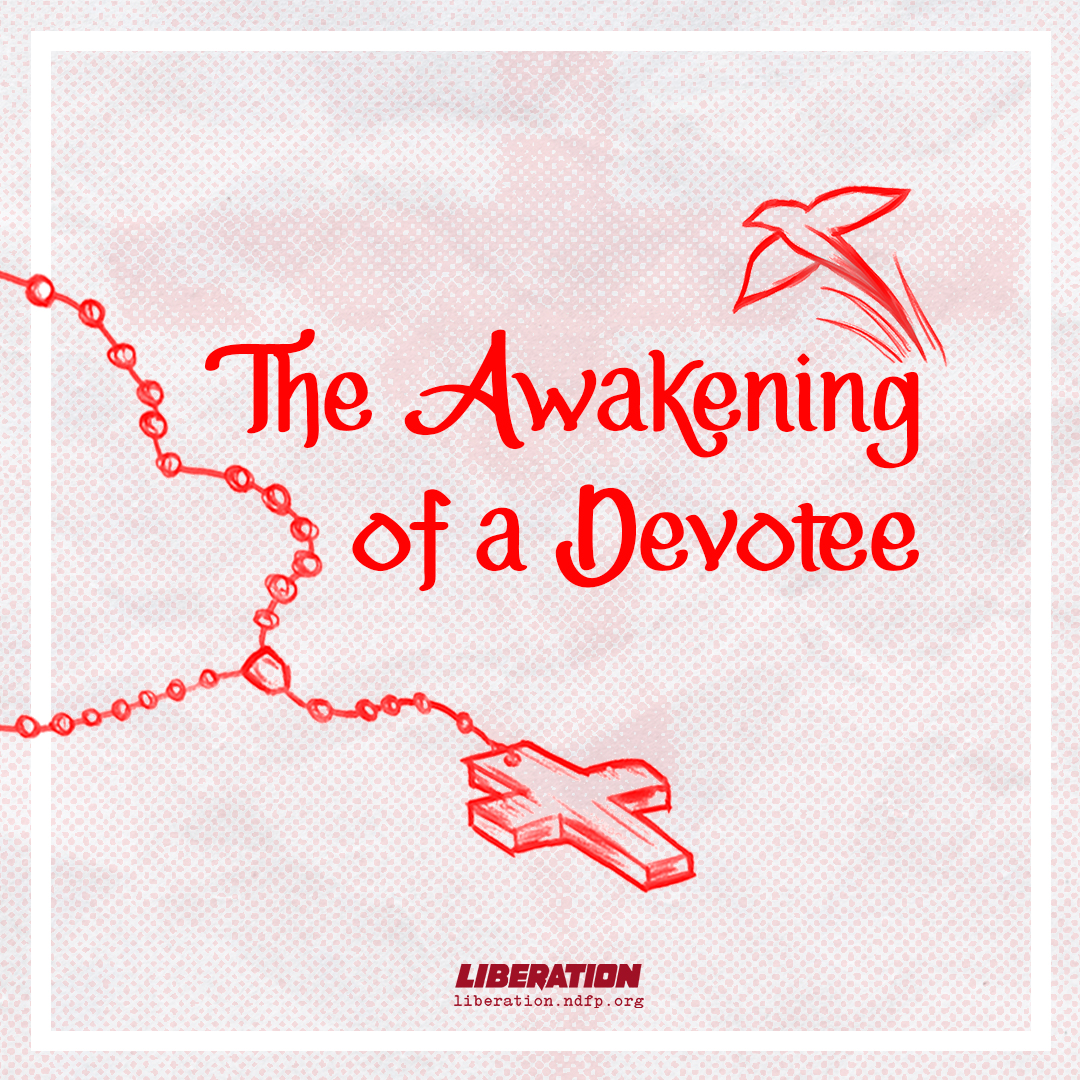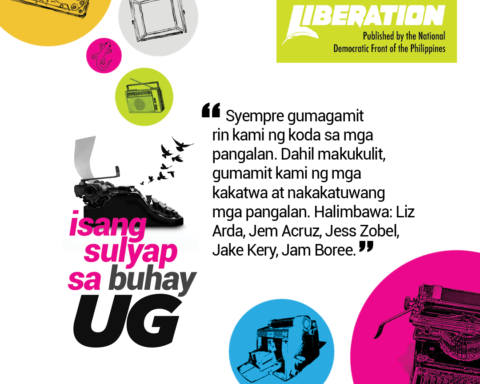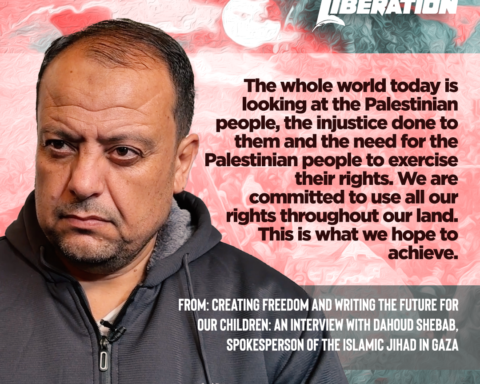She could have been a nun. But Ka Agnes’ journey made her realize that being a Catholic and being a revolutionary is not irreconcilable.
Born into a devout Catholic family, Ka Agnes was raised to embrace the ecclesiastical teachings of the church and observe its practices. She faithfully adhered to the Ten Commandments which had instilled in her the love and compassion for others.
In her college days, Ka Agnes was initiated into a larger and real world. Her course allowed her to live with the impoverished sectors in society—peasants and urban poor. Witnessing their stark conditions as they eked out a living and coped with their problems, she was disturbed at their forbearance while they clung on to their faith and pinned on it their hopes for deliverance. Fazed and disheartened, she sought for explanations. Her professor assured her that religion and the belief in God is not the central discourse in a class society but that of “who are being exploited and who are exploiting them.” Further discussions with activists in their school reinforced her professor’s words. Works of great philosophers and revolutionaries further enlightened her.
Karl Marx said: “Religion is the opium of the people.” Religion in the hands of the exploiting class has become a “dose of opium” that numbs the senses of those they exploit to make them accept their authority and whims. On the other hand, Lenin also said: “religious beliefs, in certain circumstances, may become a powerful revolutionary force” in the class struggle.
The church teachings that Ka Agnes has imbibed—“love your neighbour,” be compassionate, help the needy, “the least of Jesus brethren”—took her to a new path. Ka Agnes still goes from house-to-house but this time she arouses the masses from their stupor and enjoins them to wield the power in their hands to reverse their plight, wipe out class society, and change the world.
Active life in church
Ka Agnes’ whole family is active in church. Her father is a leader in their parish. Her siblings are either members of the church choir or acolytes during mass. Ka Agnes was in a group that spreads the words of God in communities. Saturdays are for other Church activities, such as Bible study. She diligently observed church rituals, such as visiting churches during Lent and attending midnight masses during Advent. By her strong faith in God, she believed that problems are well-taken cared of because God has always a good plan for everyone. She lived by the teachings of the Ten Commandments. As a show of love and compassion for others, she gave alms to beggars. Had Ka Agnes not awakened to the harsh reality of life and the role religion played, she could have been a nun two decades ago.
Fresh vision
Awareness and conscientiousness dawned on Ka Agnes during her college days. Akin to her interest to help people, she took up Social Work. The course curriculum required visiting depressed communities, frequently those of peasants and urban poor. The students stayed in these villages for days to gain deeper insight on the people’s situation.
Once, she came upon a family with eight children. The family head was a construction worker. The wife was a store helper. Their house of dilapidated materials and corroded roofing stood on a dingy corner of the community. Every day they dined on a humble meal that their paltry income could afford. Ka Agnes’ conversations with the family head revealed a more miserable condition. The family subsisted on a meagre daily income, with no spare for other needs. They had never received any help from the government. They were not members of the Social Security System. They relied on loans to make both ends meet, but often, still wanting. When asked how the students could help, the answer broke Ka Agnes’ heart.
“Iha, we have done everything. We had approached the DSWD, the municipality, congressmen, and our bosses at work. Yearly, we join the feast of Our Lady of Peñafrancia in the hope that heaven will answer our prayers.”
What could Ka Agnes say to assuage this man? Trust God for he has good plans for you? Would this console him? Ka Agnes was lost for words.
That man was not the last one whom she met who had hoped for answers through their prayers, who had entrusted their fate to the Divine Providence. Ka Agnes’ world crumbled, her faith shaken. She did not dare consult her father lest he might think she was beginning to doubt God. Ka Agnes approached her professor instead to find some answers. “In a class society, many of those impoverished and suffering held on to their faith for salvation. But the central discourse is not in the belief of God but on who are the exploited and who are exploiting them.”
Further discussions with her professor and activists in their campus enlightened her—one’s faith should not impede the desire for liberation and justice. Such desire is unattainable through prayers alone. She must stand with the oppressed and exploited against the oppressors and exploiters. But the ruling class will not easily relinquish their power and possessions. They are armed and they use brute force against the people to protect their interests. Thus, she realized armed struggle is inevitable.
In an exposure trip to the red army’s camp, Ka Agnes met people from all walks of life. There was a religious layman, a former deaconess, a former priest, and a youth who decided to let go of his childhood dream of self-fulfilment to serve the masses.
When Ka Agnes informed her parents of her plan to go on full-time organizing, they were furious. Determined, she proceeded hoping they will understand her in due time. She still counselled those who were troubled and weary but this time she encouraged them not just to pray and leave everything to God but to confront their problems and fight for their rights.
Ka Agnes met a lot of devotees in the barrios and she was glad to be a part of their journey in realizing they have the power in their hands to change their plight.
Ka Agnes realized that being a Catholic and being a revolutionary is not irreconcilable. As a Catholic, she was taught compassion but as a revolutionary she was taught how she could truly serve the masses and change the world.
“Whether I am in the convent or in the revolutionary army, there is only one goal—to liberate the oppressed and exploited, to ensure their welfare. The only dif ference is that I no longer look up to the red fighters like angels and wait for the consummation of God’s plan. I have joined them.” (Pat Gambao. Adapted from Kwentong Kasama: Isang Koleksyon, Unang Edisyon 2022, Published by Gintong Silahis Platung Pangkultura NPA-Bicol Region)






